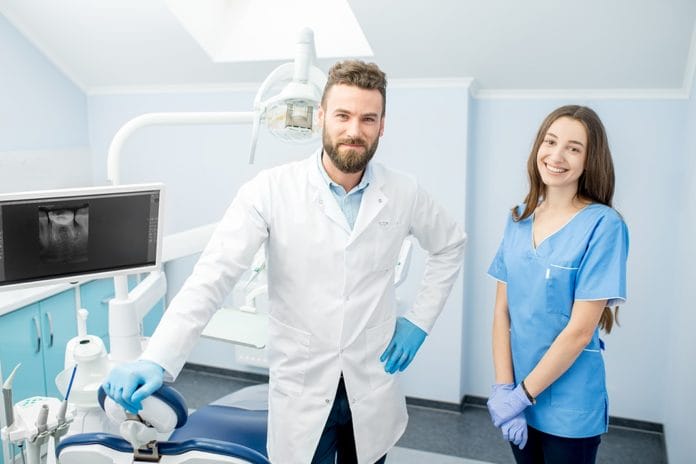Hygiene school felt like it would never end. Two years of learning skill after skill, preparing for an insane number of exams, learning more facts than seemed possible to fit into a single human brain, and having to apply it all to pass board exams have all culminated in one thing: a new wave of graduated dental hygienists.
So, what now? How does one transition from campus clinic to private practice or a public health facility? Do you stride into the office with a “fake it till you make it” attitude, never letting on that you are not 100% sure about anything? Tempting, and some may advise it outside of the healthcare fields. In our world, however, patients’ health and safety are in our hands from day one. So how to make your entrance? The best thing you can do when working in a new place, whether you’re fresh out of school or just new to the neighborhood, is to ask questions.
Every office is going to do things a little differently, and it is guaranteed that no dental office will ever be exactly the way the clinic was in school. There will be different cleaning procedures and products, unfamiliar equipment, and even totally new ways of using the things you thought you were familiar with. Most offices want a hygienist who can integrate quickly into their practice. That being said, they also want someone who does so by learning how things are done.
Reaching out to other team members to learn their ways of doing things can make that process much easier. Of course, there is the fear that by asking questions one appears less professional or knowledgeable – the precise image a newly graduated hygienist is bucking against – but by not asking, you only prolong your lack of full understanding, and may make more mistakes along the way. So how do you ask the right questions? Well…
Can you look it up?
If it is something on the schedule for next week, try looking it up in your hygiene textbook or online to familiarize yourself with the topic before going to someone else for answers. This will give you a baseline of information, so, if you still have questions, then you can ask the right ones.
A great example of this from my own experience was when I was just out of school and saw that a suture removal was scheduled in my column at the end of the week. I had only ever removed sutures on a hot dog, not a patient! That night, I went home and pulled out my notes and textbook. I studied the procedure steps every night, walking myself through the whole thing mentally. By the time the patient was actually in my chair, I felt confident that I had all of the essentials down pat. When I did run into a hiccup (the chart did not have the actual number of sutures recorded, so I could not verify that I had removed them all and completed my task), I was confident enough in the basics of the procedure that I was able to ask the doctor for the additional information without feeling like I was showing any lack of skill.
Can it help you better understand office culture or protocols?
Sometimes, it seems like knowing where to find things is enough, but when you are new to an office, there is so much more to learn. For instance, what if the varnish they use in your new office requires a semi-dry field, or they prefer that patients not expectorate the excess into the saliva ejector? If there is downtime, consider having someone go through the finer details of procedures with you. You may be able to learn more about the way things are done by watching or listening to others than you realize.
I used to listen when the hygienist in the operatory next door to me would give oral hygiene instructions. I learned so much about how to talk to patients by building on her years of experience. If you are setting up a working interview, ask about being able to observe for the first patient when you get there, or coming in a day before to observe for an hour. There is no substitute for setting yourself up to learn the most in any situation.
Does the question match the moment?
If it is your first day, and a patient emergency happens, don’t wait! Grab the first person you see and ask for help. That being said, don’t ask, “what do I do?” Show that you know what needs to happen next by asking about specifics. If the patient is having heart issues, ask someone to call 911 and where the AED is located.
If the schedule is slammed, and an assistant is out sick, don’t ask for a walk-through of their disinfecting procedures, read the product labels and do your best until there’s a break in the action. If something is done differently than the way you did it in school, make sure that you are questioning the reasoning behind the difference at the right time and in the right way. You never want to compare such differences in front of a patient. The end of the day may be a good time to sit down with the clinical leader or the doctor and respectfully discuss the practice’s operations/policies.
One Last Question…
Learning the ins and outs of an office is key to integrating into a new team. Asking questions is a big part of that. Knowing when to rely on your own skills versus going to someone else for help can make a big difference in boosting your confidence when you are fresh out of school. Making good use of the questions you do ask, and using them as opportunities to gain a more complete understanding of your new work-home, can speed up your transition into your new role. Focusing on the big picture and asking things when the time is right to get assistance will make it easier for others in the practice to help you.
Oh, and the most important question you can ask as a new graduate (or a new hire at any point in your career) is “how can I help you?” The more you reach out to help others, the more they will reach out to help you when you need it.
Before you leave, check out the Today’s RDH self-study CE courses. All courses are peer-reviewed and non-sponsored to focus solely on high-quality education. Click here now.










